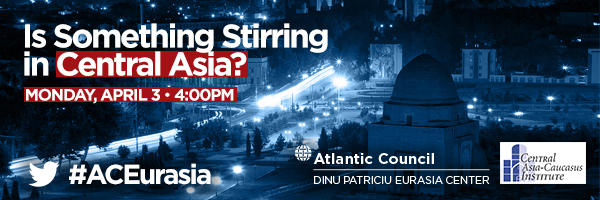Is Something Stirring in Central Asia?

Is Something Stirring in Central Asia?
Co-Hosted by the Atlantic Council and Central Asia-Caucasus Institute
Monday, April 3, 2017
4:00 p.m.
Since the death of Uzekistan’s President Islam Karimov in September of 2016, the stability that characterized key developments and overall dynamics in Uzbekistan as well as in the Central Asia region as a whole, has been undergoing a noticeable shift. Initiatives of the newly installed President Mirziyoyev in Uzbekistan and proposals regarding reforms by President Nazarbayev of Kazakhstan suggest that something may be stirring in Central Asia. This first joint forum of the Central Asia-Caucasus Institute and the Atlantic Council will present these developments, ask if they represent a real shift, and consider the implications of such changes for the Central Asia region as a whole and for its place in the world.
Speakers:
Ambassador John Herbst
Director, Dinu Patriciu Eurasia Center
Atlantic Council
Ambassador Richard Hoagland
Interim Co-chair
OSCE Minsk Group
Mr. Daniel Rosenblum
Deputy Assistant Secretary for Central Asia,
Bureau of South and Central Asian Affairs
US Department of State
Dr. Martha Olcott
Visiting Professor
Michigan State University
Moderated By:
Dr. S. Frederick Starr
Chairman, Central Asia-Caucasus Institute
American Foreign Policy Council
CLICK HERE TO WATCH THE WEBCAST
12th Floor (West Tower Elevators)
1030 15th Street NW
Washington, DC
Svante Cornell speaks at U.S.-Kazakhstan Convention, Washington D.C.
Dr. Svante Cornell spoke alongside Ambassadors Elizabeth Jones, Richard Hoagland, George Krol, and Kairat Umarov during Panel Session One – "Shaping a Future while Remembering the Past" – as part of the 4th Kazakhstan-United States convention in Washington D.C. on December 6, 2016. Video segment begins at 28:00.
"Kazakhstan-2041" study released at international conference in Astana
The Silk Road Paper “Kazakhstan-2041”, authored by S. Frederick Starr, Johan Engvall and Svante Cornell was the centerpiece of an international conference entitled “25 Years of Independence of Republic of Kazakhstan: Outcomes. Accomplishments. Vision for Future”, organized in Astana, Kazakhstan, on November 28, 2016 by the Parliament of Kazakhstan and the Ministry of Foreign Affairs of Kazakhstan.
For more detail, see:
http://www.inform.kz/en/intl-conference-25-years-of-independence-of-republic-of-kazakhstan-outcomes-accomplishments-vision-for-future-held-in-astana_a2974655
Foreign Minister Erlan Idrissov’s address to the conference is available here: http://mfa.gov.kz/index.php/en/last-news/7838
See media reports from the conference below:
https://www.nur.kz/1330651-nigmatulin-kazakhstancy-doverili-svo.html
http://www.kazpravda.kz/articles/view/itogi-dostizheniya-i-vzglyad-v-budushchee1/
http://www.inform.kz/ru/ekspert-ocenil-istoricheskoe-znachenie-nezavisimosti-kazahstana_a2974870
http://abctv.kz/kz/news/kazakstan-kajtse-oz-tagdyryn-ozi-ajkyndajdy
IMF Economic Outlook on Caucasus and Central Asia: Structural Transformation Needed

CACI FORUM
IMF Economic Outlook on Caucasus and Central Asia: Structural Transformation Needed
Wednesday, 30 November 2016, from 5 to 7 p.m.
Light reception with Georgian wines at 5; main program at 5:30
A decline in commodity prices and slowing in key economic partners such as Russia and China, had a significant impact on the countries of Central Asia and the South Caucasus. Regional growth is projected to average only 1.3 percent this year, representing a dramatic decrease in economic activity compared with growth rates of the early 2000s. According to the IMF, next year the region's economies should turn a corner, with average growth reaching 2.6 percent. Medium-term prospects remain weak, however, with growth projected to average 4 percent in the 2018–21 period, half that in 2000–14.
These and other important economic topics will be discussed as part of the Regional Economic Outlook Report, the latest IMF release on the Caucasus and Central Asia. The special focus of this year's presentation is Kazakhstan: the discussion will review this country's macroeconomic and structural policy response to shocks that began in late 2014, and will examine prospects for the medium term.
Speakers:
Juha Kahkonen, Deputy Director, Middle East and Central Asia Dept., IMF
Mark Horton, Mission Chief, Kazakhstan, IMF
Moderator:
Mamuka Tsereteli, Research Director, Central Asia-Caucasus Institute
Rome Building Auditorium
SAIS - Johns Hopkins University
1619 Massachusetts Ave., NW
Washington, DC 20036


